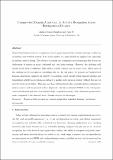Files in this item
Unsupervised domain adaptation for activity recognition across heterogeneous datasets
Item metadata
| dc.contributor.author | Rosales Sanabria, Andrea | |
| dc.contributor.author | Ye, Juan | |
| dc.date.accessioned | 2021-02-14T00:39:28Z | |
| dc.date.available | 2021-02-14T00:39:28Z | |
| dc.date.issued | 2020-03-14 | |
| dc.identifier | 266420612 | |
| dc.identifier | 45738bec-c2b7-430f-bea7-b76065648d8c | |
| dc.identifier | 85083082262 | |
| dc.identifier | 000531562400004 | |
| dc.identifier.citation | Rosales Sanabria , A & Ye , J 2020 , ' Unsupervised domain adaptation for activity recognition across heterogeneous datasets ' , Pervasive and Mobile Computing , vol. In press , 101147 . https://doi.org/10.1016/j.pmcj.2020.101147 | en |
| dc.identifier.issn | 1574-1192 | |
| dc.identifier.other | ORCID: /0000-0002-2838-6836/work/70919750 | |
| dc.identifier.uri | https://hdl.handle.net/10023/21426 | |
| dc.description.abstract | Sensor-based human activity recognition is to recognise human daily activities through a collection of ambient and wearable sensors. It is the key enabler for many healthcare applications, especially in ambient assisted living. The advance of sensing and communication technologies has driven the deployment of sensors in many residential and care home settings. However, the challenge still resides in the lack of sufficient, high-quality activity annotations on sensor data, which most of the existing activity recognition algorithms rely on. In this paper, we propose an Unsupervised Domain adaptation technique for Activity Recognition, called UDAR, which supports sharing and transferring activity models from one dataset to another heterogeneous dataset without the need of activity labels on the latter. This approach has combined knowledge- and data-driven techniques to achieve coarse- and fine-grained feature alignment. We have evaluated UDAR on five third-party, real-world datasets and have demonstrated high recognition accuracy and robustness against sensor noise, compared to the state-of-the-art domain adaptation techniques. | |
| dc.format.extent | 3557801 | |
| dc.language.iso | eng | |
| dc.relation.ispartof | Pervasive and Mobile Computing | en |
| dc.subject | Human activity recognition | en |
| dc.subject | Domain adaptation | en |
| dc.subject | Ensemble learning | en |
| dc.subject | Variational autoencoder | en |
| dc.subject | QA75 Electronic computers. Computer science | en |
| dc.subject | T Technology | en |
| dc.subject | 3rd-DAS | en |
| dc.subject | SDG 3 - Good Health and Well-being | en |
| dc.subject.lcc | QA75 | en |
| dc.subject.lcc | T | en |
| dc.title | Unsupervised domain adaptation for activity recognition across heterogeneous datasets | en |
| dc.type | Journal article | en |
| dc.contributor.institution | University of St Andrews. School of Computer Science | en |
| dc.identifier.doi | https://doi.org/10.1016/j.pmcj.2020.101147 | |
| dc.description.status | Peer reviewed | en |
| dc.date.embargoedUntil | 2021-02-14 |
This item appears in the following Collection(s)
Items in the St Andrews Research Repository are protected by copyright, with all rights reserved, unless otherwise indicated.

